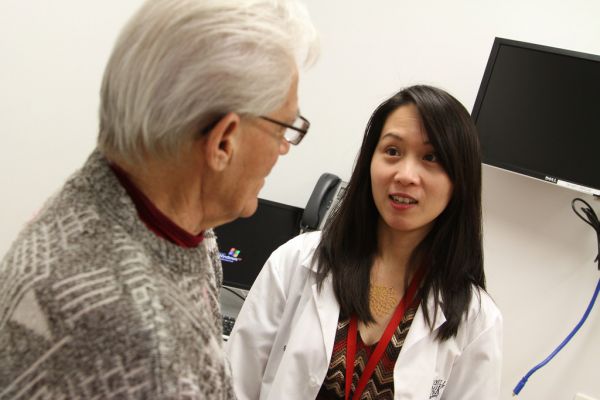June is Men’s Health Month, a time when we focus on increasing awareness of preventable health problems to encourage men to take more active roles in preventing disease and detecting and treating problems early.
Take this opportunity to remind yourself or the men in your life that cancer risks can be decreased with healthy practices and regular screenings. Here are the five most common cancers for men in the U.S. and some steps that men can take to reduce their risk.
Prostate cancer
The chance of getting prostate cancer – the top cancer risk for men – increases with age. Most prostate cancers are detected in men 65 years and older and African-American men are more likely than white men to develop prostate cancer.
Roswell Park Comprehensive Cancer Center follows the Prostate Cancer Early Detection Guidelines established by the National Comprehensive Cancer Network. These guidelines encourage men who are interested in early detection to receive a baseline-screening exam at age 45 for comparison with future tests. The results of this baseline test will determine the recommended frequency of screening exams moving forward. For African Americans and men with a family history of prostate cancer, annual screening should begin at age 40. Evaluating the result of a prostate cancer early detection test should be done on a case-by-case basis and take into consideration a man’s age, life expectancy, family history, race and previous early detection results. Men are encouraged to discuss the pros and cons of a screening regimen with their physicians.
Know your cancer risk
Find out what cancer screenings are right for you, based on age, gender and family history.
Lung cancer
Smoking is the leading cause of all lung cancer. Quitting smoking or simply never starting is the best way to reduce your risk. If you or a loved one needs help quitting, call the NYS Smokers’ Quitline at 1-866-NY-QUITS (1-866-697-8487). Screening for lung cancer with a low-dose CT scan is also available for people with certain risk factors, including those age 50 and older who have smoked in last 15 years and have more than 20 pack/years of smoking history.
Colorectal cancer
Colorectal cancer (cancer of the colon or rectum) is the fourth most common cancer in the United States, and is often preventable thanks to screening. It is very treatable when caught early, but it remains the second leading cause of cancer-related deaths in the U.S. Over 27,000 men die from colorectal cancer each year.
For those without any symptoms and who are considered ‘average risk,’ Roswell Park recommends a colonoscopy starting at age 50. African Americans are advised to start screening earlier, at age 45. Other screening tests are available, so speak with your physician about which one you should schedule.
Quit smoking, limiting consumption of red meat and alcohol, avoiding processed meats (such as hot dogs, deli meats, bacon or sausage), regular exercise and controlling your weight are all ways to reduce your risk of colorectal cancer.
Bladder cancer
Men are four times more likely than women to be diagnosed with bladder cancer. While a screening test for bladder is not yet available, research has established a connection between a sedentary lifestyle and the risk for this and other cancer types.
“You don’t have to run marathons to reduce your cancer risk, but you have to do something — even small adjustments like taking the stairs instead of the elevator, walking around the block a couple of times on your lunch hour or parking the car far away from the store when you go to the supermarket,” says Kirsten Moysich, PhD, MS, Distinguished Professor of Oncology at Roswell Park Comprehensive Cancer Center.
Melanoma
Melanoma is a serious type of skin cancer that develops in the cells that make melanin, the pigment that adds color to skin. By age 65, men are twice as likely to get melanoma than women and three times more likely by age 80. It’s important to let your doctor know if you notice any changes in the size, shape, or color of a mole or freckle, if you have any sores on your skin that don't heal or if you develop a new mole or lump under your skin. Screening can start with a complete skin self-exam every month, an especially important habit to maintain if you have a family history of melanoma. When melanoma is found and treated early, the cure rate is almost 100%.
To reduce your risk, practice sun safety by avoiding the midday sun, between 1 p.m. and 4 p.m. When in the sun, wear hats with wide brims, long-sleeved shirts, sunglasses, and use a broad-spectrum sunscreen with an SPF of 30 or higher.
Taking proactive steps
Visit RoswellPark.org/Screening and complete Roswell Park’s cancer risk assessment form to receive your personal recommendations on ways to reduce and control your cancer risk. Talk to your doctor about your results, the steps you could take to reduce your risk and when you should schedule screenings.


